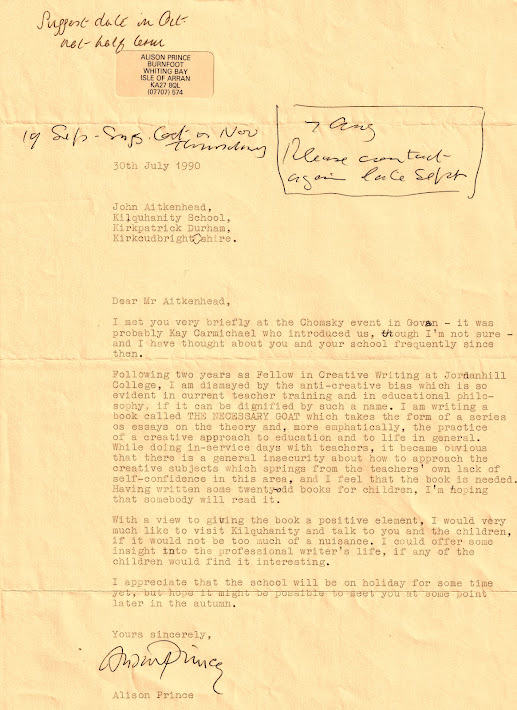1990: Noam Chomsky
Mulling it over a little bit more
Avram Noam Chomsky was born in 1928, Nowadays, he is perhaps best known as a retired American professor who revolutionized the field of linguistics in the 1950s, initiating what came to be known as the “Cognitive Revolution.”
Chomsky also gained a following as a political dissident for his analyses of the pernicious influence of corporate elites on American foreign policy, political institutions generally and the media in particular.
But perhaps even more apropos in the context of this article, he become a sort of guru to those involved in progressive left-wing ideas concerning the education of our children.
Nevertheless, the connection between Aitkenhead and Chomsky, can only be described as surprisingly thin. In fact, apart from the three letters shown below there is little else that connects them in any way.
Chomsky did visit Glasgow in January 1990. He was invited to the Self-Determination and Power Conference which was held in Govan and which both John and his wife Morag attended.
Barman on left, Chomsky on the right. I wonder if Aitkenhead ever joined them.
According to John's daughter Lois, John was "hugely impressed" with Chomsky. As a coincidence, during the summer of 1990 and not that long after the Conference, John and Morag took part in a week long gathering of friends celebrating the 50th anniversary of the opening of Kilquhanity School . In fact, the following letter from Noam suggests that John may have spoken to him during this period about his school and must have sent him “material about Kilquhanity House”.
The date of the letter, however – 7th November 1990 - several months after the meeting or meetings in Govan and the 50th anniversary celebrations, suggests that there may have been other contacts between them over this period. Unfortunately, I have no record of anything of the sort.
Chomsky’s mention of an ‘appeal’ is also difficult to understand but probably refers to some sort of an attempt to persuade him to contribute either economically or in some other way to help in the continued running of the school. Chomsky’s lukewarm response makes me wonder how long he mulled it over - if at all
During the Conference, John was introduced to Alison Prince.
Alison Prince
The “Kay Carmichael” mentioned is almost certainly Catherine Carmichael (1925 – 2009) who was an influential figure in Scottish politics and an anti-nuclear power activist.
Cover of book written by Kay Carmichael who was also a senior lecturer at Glasgow University.
Alison and Kay must surely have been among the many who were John’s admirers, who were also present at the Conference.
Incidentally, as well as writing the book referenced in her letter above she also wrote, what I consider to be, the best, and most delightful biography of Kenneth Graham, author of Wind in the Willows.
The final letter is from Max Paterson.
Max was influential in the development of children’s services in Scotland. He trained as a clinical psychologist. In 1962 along with others, he developed a psychological service for the List D (Approved) schools.
He was involved with the introduction of the Children’s Hearing system in Scotland as well as with Loaningdale School alongside John Wilson, a friend of John and Morag and former teacher at Kilquhanity.
Loaningdale House - No longer an Approved School
In 1973 Max went on to become Head of Wellington School. He was a founder member of the Scottish Institute of Human Relations.
This second letter from Max to John reflects on his continuing to work in the best interests of children with learning difficulties as well as his faith in Kilquhanity. The letter also hints that Aitkenhead would have been quite chuffed if he had ever received Chomsky’s eventual support.
The problem is whether John ever agreed to allow Max to write to Chomsky. I doubt it somehow. And I suspect that neither did John get the support for his appeal that I am certain he probably expected.











